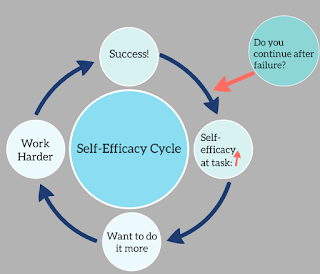Building self-efficacy and the importance of positive reinforcement -Emery Boyle-Scott
In class we talked about how self-efficacy at a task is achieved because of success and that it causes you to like the task more, which causes you to be more likely to succeed which in turn increases your self-efficacy at that specific task. Sometimes success isn't possible or doesn't happen, and self-efficacy is what determines if you continue after failure. This is pretty much a positive-reinforcement loop.
So, how do we get there? We know self-efficacy is linked to higher performance in academics. We know self-efficacy is important and necessary for living a life full of activities, challenge, growth, and so on. How do we improve students' self-efficacy? We make people experience success.
 |
| Self-efficacy cycle as described in class on 7/21/17 |
In the classroom this could be done with students setting small goals:
- This week I will....
- learn 5 more multiplication facts
- read 2 chapters of this book
- read 10 more sight words
When the goals are met, and you've got to make sure they are, use a lot of positive reinforcement to highlight the success and guide students to continue the cycle of setting a goal, working toward it, achieving it, feeling success, and repeat. Perhaps the successes found through this process could be the classroom bulletin board? Students posting their proud moment of the week.
As leaders we should practice something similar with our teachers. Instead of heaping the giant pile of everything on their shoulders all at once, guide our staff to be more deliberate with implementation. Although it is important begin with the end in mind, we can't achieve that immediately, rather we set smaller, realistic goals to guide us down the path. As smaller goals are achieved, reinforce positively. I'm not sure the best way to do that for adults, I can't wait to see what we all observe, know, and try this coming year.
-Emery Boyle-Scott
Thanks for posting this, Emery. The visual is really helpful. I know that the self-efficacy loop is driven by successes, but it got me thinking about the inverse: why do I give up on things I'm not good at (presently)? I was talking with a friend about this recently, and we both reflected that for much of our upbringing we tended towards activities/things that we were good at; so we did that activity more, got better, had more success, participated in the activity more....and the cycle goes on. However, as a result, I went to college and realized that I was pretty bad at perseverance and that I had the tendency to give up on things when the first few attempts didn't go well.
ReplyDeleteI was someone who succeeded at school. I know that many of our students will not feel that way. How can we encourage effort, attempts, and even failure when it comes from safe risk-taking? How can we focus attention to growth, engagement, and the action of trying, rather than seceding to defeat by not even giving it any effort?
Sometimes I wonder what skills, hobbies, interests, etc. I'd have if I had put in more effort on the front end and not been so quick to give up and move back to something else where the self-efficacy loop was in full force.